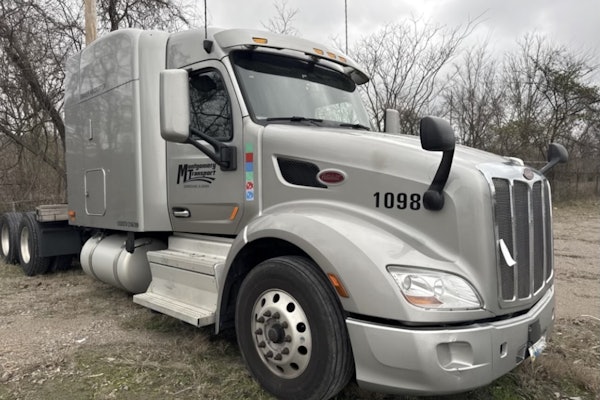Arctic Express, a Hilliard, Ohio-based refrigerated carrier, has emerged from Chapter 11 bankruptcy. The company sought bankruptcy protection after a federal court ruled that Arctic owed owner-operators $5.5 million due to improper handling of escrow accounts. Artic settled that case in July with the Owner-Operator Independent Drivers Association for $900,000 paid out over four years.
J&R Schugel Trucking, a 500-truck carrier based in New Ulm, Minn., has added more options to its home-time schedule for drivers. The company’s 5 & 2 Program allows two days at home after five days on the road. Other two- and three-day home-time options are available to longer-haul drivers and owner-operators who are out 10-14 days.
Con-Way Central Express, a LTL division of Con-Way Transportation Services, has opened a new, larger service center in Greencastle, Pa., that allows the company to better handle growing volumes of commercial freight. The new facility delivers freight next day to locations in the Northeast and Mid-Atlantic states.
Canadian truckload carrier Contrans Income Fund has acquired Toronto-based Firm Transportation and Distribution Services, a third-party logistics provider for customers that need North American transportation services. Firm assists with paperwork, provides online load tracking and coordinates additional air and ocean transportation if needed.
My first day on the job running the operations for a major truckload carrier, I got a call from one of our drivers. He asked when I was going to do something about “them lying dispatchers.” Most operations managers are familiar with this complaint, but what’s behind it?
Recognize that while the effort involved in hauling different loads varies greatly, the pay usually remains the same. In some operations, it is difficult to get drivers to take certain loads. So dispatchers may have to promise drivers that if they haul the poor load, they will get a better load down the line. And if the dispatcher fails to line up the promised good load quickly enough, then of course the driver believes the dispatcher lied to him.
Sometimes the dispatcher does secure a better load for the driver, but it doesn’t quite match the driver’s expectations. Again the dispatcher can be branded as a liar. Rookie dispatchers often make promises they can’t keep. Once credibility is lost with drivers, it rarely is recovered.
What about other drivers who also may have wanted one of those desirable loads given to a driver that just hauled a poor load? At most trucking companies, the first driver in an area to be unloaded is the first to reload. They know when loads become available and when they were empty. When they see a driver get moved up to the head of the list, they think someone is playing favorites. Drivers really do compare notes as to who got what loads and when.
Who gets what load is one of the greatest sources of tension between drivers and carriers. Drivers new to the company particularly are vulnerable to getting assigned poor loads; they have no idea what other loads are available in an area. Nor do they have any credits built up with dispatchers. It is one reason why turnover among new drivers is so high. Operations managers should monitor what loads the newbies get and make sure they aren’t assigned a disproportionate number of poor loads.
Different loads, different pay
There is no quick or easy solution to this problem. In the long run, the solution is to establish different rates of pay for different loads. For enough money, all loads become desirable. You can see the trend toward increasing the desirability of all loads by carriers offering additional pay for going into or out of New York City. Paying based on a percent of load revenue is another way to ensure that compensation is in line with the work effort involved in a load. It would not surprise me to see carriers, particularly those using owner-operators, going back to that method of compensation.
One of the blessings of the change in hours-of-service rules is that it helped reduce greatly the amount of work drivers were asked to perform for free, such as sitting at docks waiting to be loaded, or hand-loading trailers.
Not all drivers want loads to New York City regardless of the extra pay offered. Yet if offering $100 in extra pay entices 30 to 50 percent of your drivers to want New York City loads, that takes a huge pressure off dispatch.
Customer protection
Pay isn’t your only tool. One major owner-operator carrier amended its first-in-first-out rule to allow pre-selection on a driver’s next load if he agreed to haul one no one else wanted. Under this plan, if a group of drivers in an area turned down a load, it could be designated by dispatch as “customer protect” load. It then would be reoffered to the drivers with the provision that they would move up to the head of the list for load choice in the area the “customer protect” load delivered. The driver could be pre-assigned to his choice of load prior to becoming empty.
This policy has worked fairly well for the carrier, and its drivers accept its fairness because they now could see why a driver moved up in line. Of course, drivers still levy charges of favoritism, but the practice has helped keep the complaints at a lower level than expected for a carrier its size.
Driver complaints about “lying dispatchers” always will be with us. But you can reduce turnover by recognizing the source of those comments and do what you can to take dispatchers out of situations where they can become branded as liars.








